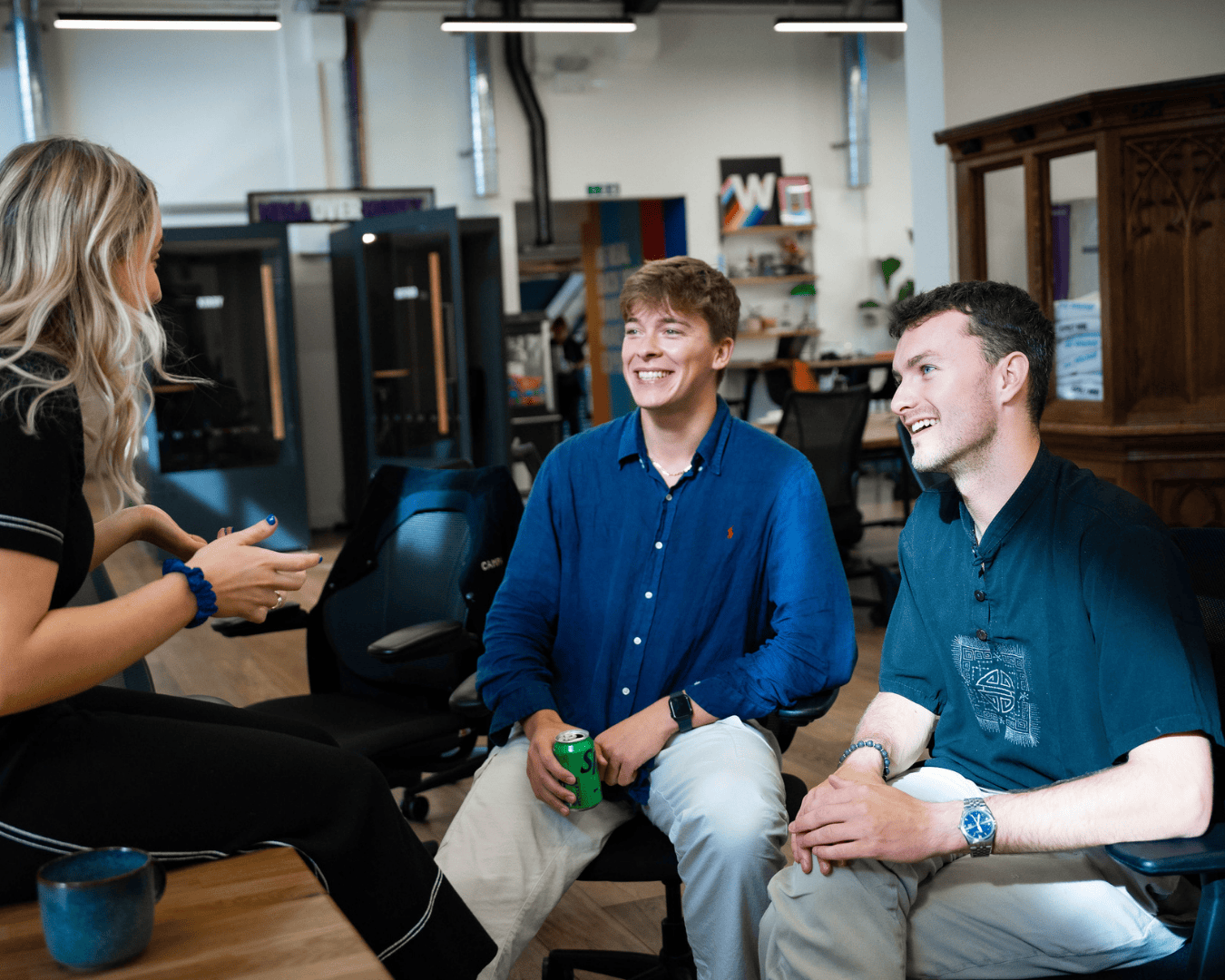People are fiercely protective of their ability to WFH, and when it’s threatened, reactions can be serious: after Amazon announced the 5-day in office work week returning, 73% of employees reported that they’d considering quitting. Ouch.
In light of research from Deloitte's 2023 Gen Z and Millennial Survey finding that more than three-quarters of UK Gen Zs (77%) and Millennials (71%) would consider seeking new employment if required to work in the office full-time, this makes perfect sense.
Afterall, 2024 research from Jabra finds Gen Z is disrupting the workforce by valuing flexibility above all (even salary)!
However, preferences around being in the office are distinctively different: a survey by the Times found that 53% of Gen Z employees choose to commute to the office five or more times a week, compared to 39% of workers aged 55-64. There’s clearly a paradox here – why the generational difference?
Experience from Wiser’s development team finds that there’s more going on under the surface for what Gen Z value in their roles and what they expect in development opportunities. As a caveat, I'm not here to trash online working, or deny its many benefits for the average worker, but it's not the best option to support those at the start of their career. I'm here to tell you why it’s beneficial to train your early career talent in person as much as you can.
Key skills early careers talent need
Let’s be real: Gen Z's have really been dealt the short straw. With burnout rates of 58%—higher than any other generation— they’ve also experienced their education/onboarding hindered by the Pandemic, greater financial pressures during a cost of living crisis and an increasingly uncertain global future is hindering their ability to cope and navigate workplace dynamics (BBC, 2024).
Despite being the most-educated generation, many Gen Z graduates feel unprepared for the workplace: Gartner found that over half (51%) believe their education hasn’t equipped them with essential skills like negotiation, networking, and adapting to in-person work environments. Research from Intelligent backs this up, with 41% of business leaders agreeing that Gen Z is unprepared for work.
Communication is a key gap—though skilled in academic expression and informal correspondence, many struggle with workplace styles, tone, and relationship-building through written business communication (British Council, 2024).
Interpersonal skills are another challenge: Harris Poll found 65% of Gen Z admitted to difficulty making conversation with colleagues, struggling to find topics of relatability without a spouse, pet, or children.
Why are these skills lacking in early talent?
Gen Z’s lack of workplace-ready skills can be traced to a perfect storm of influences. Formal education often overlooks the interpersonal and emotional competencies crucial for professional success, while the shift to online learning during the pandemic limited opportunities for face-to-face interaction.
Coupled with Gen Z’s digital-first upbringing and universities increasingly prioritising virtual delivery, the development of soft skills like communication, collaboration, and emotional intelligence has taken a hit, according to research from the British Council. These factors have left many in this generation navigating workplace dynamics without the same level of in-person practice as previous generations.
What do early talent want from development?
Gen Z are a bit of a paradox: their skills have been hindered by virtual learning, yet Deloitte’s research concludes that they crave flexibility of learning and exposure in the workplace.
We find that Gen Z values transferable skills and adaptability, seeking security in an uncertain job market.
Despite being digital natives, their desire for human connection remains strong; Deskbird research finds in-person interactions are their preferred communication style, even over online meetings. At the same time, they expect training to be concise, visual, and individualised (Shiftlearning, 2024).
To engage Gen Z, their development must strike a balance: embracing flexibility while still fostering face-to-face collaboration and a focus on interpersonal skills, to provide the human touch this generation truly values.
The pros of in person
First: people are more present when other people are physically next to them.
Be honest: it’s much harder to discreetly check your emails or quickly finish that deck when you’re sitting in a room with others, surrounded by the subtle but powerful pressure of conformity. In a shared physical space, social norms naturally encourage you to stay on task and engage, as the mere presence of others increases accountability and makes it easier to conform to collective expectations (Rauch, 2022). In contrast, any kind of online work allows for more flexibility — but often lacks the social cues that help keep us focused.
Second: the novelty of a different environment.
Getting people away from their desks and into a different environment with new people is a bio-hack for creating interest. Why? Our brains thrive on novelty (Daugherty, 2022). When we experience something new, our brains flood with dopamine, boosting the retention of information.
Third: a real person is more engaging than that same person on a screen
We can all agree at how unappealing it is to stare at a screen all day. Screen fatigue comes with eye strain, headaches, and reduced concentration, which can not only diminish engagement and retention, but cause your ROI to plummet. Research from Henry (2023) It’s much easier for people to be immersed in a hands-on environment, where they are constantly asked questions and interacting, boosting their engagement and mental stimulation.
Finally: in-person L&D facilitates unique bonding for high performance
In-person programmes offer a supportive environment, where it’s easier for attendees to connect and learn from their peers (Henry, 2023). It offers a rare chance for participants to pause, reflect, and focus on personal development – something that doesn’t come often in our fast-paced world. These connections help early talent start building a valuable peer network early in their careers and build psychological safety – the CIPD’s key behaviour for high performance.
What about the disadvantages?
Let’s keep it real, in-person development has its drawbacks, which can make in-person training less inclusive and harder to implement on a global scale.
When trying to connect a multi-regional cohort across different time zones, coordinating travel, finding central locations, and accommodating various schedules can be both logistically challenging and expensive.
Accessibility and inclusivity is another concern, as individuals working remotely due to family commitments, disabilities, or health reasons may find it impossible to attend.
Additionally, in-person sessions are often one-off events, meaning those who miss them lose the opportunity to learn unless a repeat is scheduled—something that isn’t always practical. Unlike virtual sessions, in-person learning generally lacks the flexibility of being recorded for later access.
These downsides shouldn’t be ignored. They highlight that some cohorts benefit best from a blended approach that combines the strengths of both in-person and virtual learning. The ISE (2024) found 47% of respondents reported that the development programmes that were delivered through a face-to-face approach offered the highest quality experience, 40% reporting hybrid and 0% saying virtual.
Summary
So, while some things might indeed be best left online, early talent development isn’t one of them. For maximum benefit to your training of early careers populations, it’s clear that you’ll get the most bang for your buck in-person.
If we want to truly invest in our future workforce, we need to unplug, step away from the screen, and dive back into the real world.




